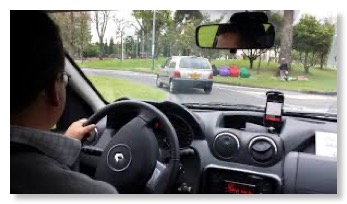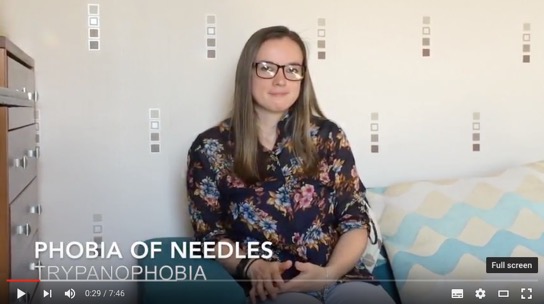Exercising Mindfulness While Driving

So why would you choose to practice mindfulness while driving?
There are numerous reasons why being mindful while driving can be incredibly beneficial to a daily commuter. First of all through being more 'present' while driving and not having your mind elsewhere you can better learn to enhance your focus rather than reduce it. Many road accidents tend to result from people driving without due care and attention because, for one reason or another, their minds are more focused on the day ahead rather than the road ahead. Apart from making driving safer, mindful driving can also ease the stress associated with commuting so that you can arrive at your destination more energised, refreshed and focused, rather than frustrated, irritable and unproductive.
Let's try a short exercise. Next time you are driving try switching off your phone, or at least make sure its silent or placed where it can't distract you. Avoid eating and just for this exercise, as a kind of experiment, switch off any background music or radio so that you can give your full attention to the exercise. Now as a first step, give your full attention to what's going on around you. Notice everything from the cars, trucks, bikes in front to any you can see with the use of your side and rear view mirrors. Notice your speed, if you know intuitively that you are going faster than the limit try slowing down. Remember this is just an experiment to teach your subconscious more mindful living. With me still? Great let's continue….
Back to driving within the speed limit. Too often we are in a hurry to get somewhere even though it's only an illusion born out of our 'go go go' society. You are more likely to reduce stress by driving slower if you know as a rule you may not always honour the code. Moreover you will also be setting a good example to all drivers. Just making this very small change can help you switch out of the normal habitual state of mind, which for most people is part of the subconscious norm which is responsible for more stress in life than we actually need. Next instead of focusing on your radio or background music which actually can make you more mindless than mindful, focus more on your breathing as you drive. Take a deep breath in through your nose and as you exhale, breathe slowly out through your mouth while paying attention to how calm that out breath makes your entire body feel. Repeat this over and over and as with any new habit you will begin to realise that not only is your mind feeling more clear but you are more readily able to concentrate on your driving almost without effort. Instead of getting lost in trains of thought, you can feel more present and aware. At first your mind may try to wander, so simply keep bringing your attention back to your breathing each and every time this happens until it becomes trained to 'behave'.
While driving and as you keep the majority of your attention on your driving, turn a percentage toward your bodily sensations. Scan for any tension and release that tension if you can. Be aware of any feelings of ligament or muscle tension in your head, shoulders, neck, back, torso, hips, legs, calves and feet and simply choose to let those areas go limp loose and relaxed. If you can't then just be aware of whatever comes and accept that awareness. This is what we refer to as mindfulness. Next you can open your attention to your surroundings again. If you approach a red light, try to slow down and see the red light as an opportunity to pause rather than something you should resist. The red light is there to remind you to pause. While you pause take some more mindful breaths maybe focus on the colour of the sky or shape of the clouds or if you are in the UK more likely listen to sound of the rain. With practice you can end up looking forward to the red light instead of dreading it, seeing it as a chance to breathe and refocus.
Even traffic jams can become a mindful experience. Realising that the traffic is already there you can learn through mindfulness to accept not resist. Fighting the traffic, constantly trying to win the lane battle, ultimately makes no difference. Instead let your mindful attitude encourage smiling and again just focusing on the breaths. Use this time to glance at other drivers and mentally wish them well. This may sound an unsual practice, but as you do this you will notice your attitude automatically becoming more friendly toward other drivers. Even when someone cuts you up while driving use the same technique to wish them well and hope they will be happy. You will find that swearing at people or feeling angry has only one outcome to enhance your overall stress and it's too late anyway so just let it go and return your thoughts to your breathing.
Mindfulness can help the journey be far more enjoyable and can make the entire experience on average sixty to eighty percent safer and more focused. As you drive in this mindful way, feeling more present, value your driving and arrive at your destination in a far more positive and balanced frame of mind.
Here at the Cumbria Hypnosis Mindfulness clinic we teach several strategies as well as mindfulness to anyone wishing to overcome any limiting belief, behaviour or emotion. If you would like to learn more then please click here
Wishing you a balanced and positive day
David Faratian (NLP Practitioner and Clinical Hypnotherapist)
A growing gambling problem
18/10/16 13:44 Filed in: gambling | Addictions

What is FOBT?
Problem gambling is not just about losing money. It’s a compulsion which can destroy families. The main focus for most addicted gamblers is now not just the machines found in the high street bookmakers, but is more likely to be found through the convenience of an online betting site or a betting app on a smartphone.
Most gamblers lose money over many years and often manage to hide their activities from the ones they love most. This in itself promotes, stress born out of the shame of lying and deceiving, which in turn can lead to a number of general anxiety disorders.
So called fixed odd betting terminals or FOBTs are one of the most common outlets for betting. Online roulette, among other FOBTs can be found in every betting shop across Britain. FOBTs appeal, for want of a better word, offer the dangerous combination of high stakes and the chance to win quick returns. This powerful illusion of getting rich quick can often lead to the gambler losing sight of what’s important. There are an estimated three quarters of a million problem at risk gamblers across the UK.
So what makes FOBTs so addictive? What makes people play at the expense of friendships, family and relationships. Gamblers themselves are the first to admit how it is easy to get lost in this world they find themselves immersed in. One of my clients recently admitted to having been able to lose more than three thousand pounds in less than an hour. This is not unusual however, such is the pull of the FOBT addiction. Is it any wonder that the guilt, shame, embarrassment of losing vast amounts of money in such a short period of time makes most gamblers lie about their behaviour and try to deny to themselves and others that there is a real problem.
The fixed odds betting terminals offer mostly games of chance, but most people play roulette. The occasional wins unfortunately are responsible for a release of a hormone into our bodies known as dopamine, which stimulates that feeling associated with every kind of addiction, from eating chocolate to drinking alcohol to betting on 32 red on a roulette wheel. The problem is not that the feeling of winning is bad its the fact that it confuses the reality of that occasional win being far outweighed statistically by the dozens of losses which eventually lead to ruin. The ‘high’ experienced through the release of dopamine means that a gambler will go to any lengths to experience more and more of the same feeling even after having lost, even if that means chasing those losses and convincing themselves that there is some way to recover. A spiral of despair as the losses grow means the gambler will stop thinking with the neo-cortex or logical brain, and instead think more with the completely emotionally driven part of the brain. This is when it becomes very dangerous because the losing gambler at this point is not thinking rationally but instead being led by a completely separate entity hell bent on recovering at any cost but often with FOBTs that means total and complete ruin in the long term and even often in the short term.
Gamblers are prone with FOBTs to seeing patterns where there really aren’t any. They convince themselves that the numbers the ball landed on in the past must somehow give them a statistical edge. Of course this isn’t true and the FOBT promoters deliberately count on this illogical rationale to deliver what always ends up being the ‘house edge’ at the expense of the unsuspecting punter.
The spinning of the wheel, the noises and the experience generated by the FOBT is all designed to ‘pull in’ the gambler even though they have no effect on the result. Of course the result is always completely random.
Most scientists would argue that once you are addicted it is very hard to stop. I would argue, however, that gambling and the feelings associated with gambling are emotional in source and therefore any area of the brain which has learned to associate emotionally can either replace those emotions with new more powerful counter balancing emotions or can simply unlearn the habit at an emotional subconscious level. Either way the effect is the same if the thought behind the behaviour is no longer stimulating excitement or enjoyment because the levels of dopamine have been reduced, then the addiction begins to break down at an emotional level and can in effect be eradicated. Through my ten years of contact with seriously addicted gamblers, and not just those addicted to FOBTs, I have developed hypnotic techniques which in effect neutralise the reward centre of the brain by shifting awareness and perception. This approach has had great success with a full range of gambling activities, not least FOBTs and continues to challenge any notion that once a gambler always a gambler.
The way hypnotherapy works with the gambling habit is well covered on this website, but the area of FOBTs is a growing problem and one which threatens to enrol a new more ‘smartphone’ vulnerable generation of young gamblers who are already being seduced by seemingly harmless online games which at their heart have only one objective and that is to stimulate betting, and spending behaviours. That is why I wanted to write down why I believe we must be more mindful of the dangers we might face, either as a parent, a friend, a concerned partner or of course a current practicing gambler who can relate to much of the material here
Watch previous testimonials here
https://www.youtube.com/watch?v=IwIQ3JJMe6A
If you are currently struggling and would like to know how hypnotherapy can help you challenge and defeat your gambling addiction then simply request a completely confidential free consultation by clicking here, and I will be happy to explain how I can help.
Wishing you the very best with your search
David Faratian
NLP Practitioner and Clinical Hypnotherapist
Spider season is approaching!

Practically every year as summer waves goodbye and autumn re introduces itself with a hint of cooling and wetter weather, I can get my calendar out and circle some key dates. What dates you ask? The dates in question are during September and reflect the start of spider season and dates which invariably result in people calling up a service like mine and seeking help for this uninvited ‘terror’. Spiders suddenly seem to be crawling out of the woodwork and terrifying the nations many sufferers. The truth is of course that spiders don’t just appear in autumn and are always present throughout the year but just like anything we give focus to, we are more likely to notice them if we choose to and certainly more because we believe autumn is the worst time for spiders. Unfortunately when we have had a wet summer the chance of noticing these little visitors is more likely but you know that already so what’s the point of my blog?
Spider phobia or as you already know it, arachnophobia, affects 55% of women and 18% of men in the UK. It is a real phobia in the sense that it causes all the symptoms of panic and triggers the freeze, flight and fight response in the sufferer which is hard wired for impending danger and a need to defend oneself from attack. Truth is of course that in our country the number of truly ‘dangerous’ spiders amounts to 0.01 % and even then none of those breeds are found in the typical house spider which is what we are talking about here. When it comes to be scared of spiders our irrational minds, also known as our limbic response builds a picture of the spider being a much bigger entity than it actually is, whether that’s the body, movement, legs, we tend to experience a perception of a creature that belongs more in a 60s horror film rather than reflecting the wholly non threatening insect it actually is. So why is a tiny insect that’s only function is to hide and survive and an insect that certainly has no mission for human domination such a perceived problem. Let's not fool ourselves, spiders are not very attractive and certainly wouldn't win any beauty pageants but they are also not the monster our minds tell us they are. Spider phobia, like most phobias is nine times out of ten born out the unfortunate association we make with them at moment in time, usually childhood when a spider may have caught our eye and caused a spontaneous moment of panic which resulted in the release of the threat hormones cortisol and adrenalin. Now as adults our conscious brains may have forgotten that experience, but since that point when we may have been too young and defenceless to rationalise the startled feelings, we therefore get good at over generalising every future experience which involves an encounter with any spider and those old feelings just reinforce the already negative learning and so the phobia around spiders is born.
But it doesn’t end there. Once a person declares themselves a spider phobic, they begin projecting into the future, creating an anticipation of how they are likely to feel when encountering the next spider even though they haven’t even seen one. In other words, they anticipate anxiety before even having any justification for this belief. Then again, why would they feel any other way. Every single experience in spiders has never been a positive one and they have had no way of rationalising or neutralising these thoughts to create a more positive point of reference and so the phobia seems incurable and debilitating. The end result is more often than not an over anxious person, especially around this time of year, who is constantly on guard and worried. When, God forbid, a person actually encounters a spider then they have to get someone else to remove it or they never enter that room again. This of course is all too common for anyone who identifies with this unfortunate limiting belief.
So can it be dealt with. Can you be spider phobia free, and be cured? The simple answer without any doubt whatsoever is YES. That’s where I come in. Here at the Cumbria Hypnosis Clinic we recognise the fact that spider phobia is a construct of the emotional sub conscious brain. That being the case it is also true that is has been programmed through experience and memory to believe spiders are a threat, therefore the emotional, irrational brain can also be re-programmed through a number of psychological processes to recognise new and more empowering feelings around the encounter, whether in reality or just imagined, with a spider. The sub conscious, responsible for the majority of our independent, thoughts, feelings and emotions can be imprinted with a new set of reference points which teach the individual suffering with the phobia to recognise the thought of a spider is simply not resulting in any anxious feelings, no sense of impending doom and there can even be a sense of feeling more and more relaxed around the very thought of the spider and experience which practically wipes clear the old connection and replaces it with thoughts of confidence and being able to function.
"Since seeing David I have been free from my fear around spiders for more than four years. My husband mentioned it was that time of year again the other day and I hadn't even realised nor was I bothered. Anyone thinking about this, all I can say is give it a go, it worked for me" Jane S (Windermere Cumbria)
What I teach you is set of practical, no nonsense skills, which don’t require any effort, to help develop a sense of independence and confidence around thoughts to do with spiders. This process is highly effective and permanent for more than 85% of the population. If you have been a sufferer or you are currently reading this and want to know more, then please click this link for more information and opportunity to have a free phone consultation. As with every treatment offered by Cumbria Hypnosis I offer the guarantee that if I don’t feel you qualify as one of the 85% then you won’t pay a single penny and so there is absolutely no risk for you if you are not completely sure this is is for you. Remember that any limiting belief you weren’t born with can be changed and removed so why continue suffering…..?
I look forward to being able to explain how I can help you.
Regards
David Faratian (NLP Practitioner and Clinical Hypnotherapist)
Overcoming fear of needles

The fear of needles, whether visiting a dentist or simply needing to give blood is a very common phobia and one rooted in negative childhood experience. Trypanophobia, the technical name for this limiting belief creates the typical fight or flight response around any perception of a needle being used to either inject medication or draw blood. One such sufferer, Molly age 23, a teacher from Barrow recently came to see me about her fear. Molly like so many sufferers had managed to condition her anticipation of anything blood or needle related into an over generalised anxiety. When this happens there is almost a reflex release of adrenalin with the mere thought of the trigger picture, which in turn becomes a learned behaviour. Through a number of layered desensitisation processes Molly was taught how to own the feeling of anxiety instead of resisting it, and thereby helping her to recognise the feeling so that it could be brought under her direct conscious control.
You can learn about Molly's experience with hypnotherapy here. In this interview Molly was happy to explain how the journey she went on with hypnotherapy (EMDR) was seen as a last resort, having tried everything herself beforehand to combat the anxiety through talking and sheer self will, Molly realised she was preventing herself from even visiting a doctor and therefore needed an alternative solution. Hypnotherapy was that solution and as we discover form Molly she was able to notice the benefits of treatment following her first session, and indeed she was noticing changes in attitude toward her anxiety on a weekly basis. The most dramatic revelation that the phobia had essentially been cured was seen first hand when Molly attended her final session. Feeling she was drained of energy Molly asked her doctor for a way to measure her blood glucose levels. Molly was provided with a blood sugar self test kit which she brought to her session. Remembering that a few months previously Molly hadn't even been able to speak about blood or needles, now here she was pricking her finger to draw blood with no signs of anxiety or fear. This demonstrated how powerful an empowered subconscious can be when dealing with any limiting belief. Once Molly had created her new point of reference which gave back her control the phobia essentially broke down at that stage.
The power of hypnosis, as one of the many tools used here at the Cumbria Hypnosis clinic, to deal with any phobia is becoming more and more accepted within the mainstream as an effective treatment for many generalised anxiety disorders. If you have arrived at this page with a general enquiry or a more specific problem then you may be able to find the solution you have been looking on this site. The process for contact is simple. Please fill in the enquiry form by following the following link and request your free callback when you can explain your issue and have a chance to ask any questions which have not been covered in this article. For a full list of treatment follow the link here.
David Faratian
Anger in the workplace
04/04/16 12:07 Filed in: Anger hypnosis

Recently one of my male clients who we will refer to as Graham from Windermere in Cumbria approached the Cumbria hypnosis habit change clinic for help with his anger. Anger management refers to the techniques that people can use to control their feelings of extreme emotion and how they use these techniques to avoid situations which can trigger anger in certain situations and with certain people.
Unfortunately for Graham he was being challenged by his frustration around the behaviour of some of his work colleagues. The problem with anger management in the workplace is that negative behaviours can very quickly threaten not only important relationships but also can threaten the very livelihood of the person suffering with the anger issues. Generally speaking, problems with anger in the workplace are dealt with directly through the employer by sending the individual concerned to an anger management class. Through these classes, and with most anger management therapy, the individual is trained how to identify the triggers, and at the same time given strategies to neutralise the trigger. Indeed hypnotherapy and the coaching that we offer here at the cumbria hypnosis clinic can successfully teach an individual how to deal with these unproductive feelings, and to control the reactions at a subconscious level which can lead to more healthy responses rather than reactions. With the exclusive methods which we teach here at the clinic you are taught to rid yourself of the in a cause of unwanted anger. This method is powerful and the complete system and can be used to get the most successful outcome out of any situation involving anger. Hypnosis and hypnotherapy can give the tools necessary so that you can express your emotions in a healthier and safer way thereby avoiding unnecessary conflict and damaging outcomes whether in personal relationships, in work scenarios, or simply in terms of the self inflicted stress that anger can cause.
Since treatment, Graham has felt empowered so that his anger no longer feels like an automatic response over which he has no control. In his own words;
“At times all I could see was red and from that point onwards anything could happen. It really scared me. David has told me how there is no point resisting the emotion and through his strategies I have learnt to bring the emotion immediately under my control before it has chance to take over. What’s great about this therapy is that I don’t need to really try to calm down now it’s just the way I am. Since seeing David I am sleeping better and feel I have far more energy to channel into my life.”
With our clinic helping people across Cumbria, including Windermere with flexible appointment hours, this service may have and answer to your problem with anger. Follow this link for more information about the service OR click here to request your free 20 minute consultation.
Stage Fright Anxiety

Not so long ago I had a client who came to see me about a lack of confidence standing in front of colleagues. Paul (name changed) from just outside Ulverston in Cumbria had recently been promoted to a position which required him to over see a number of colleagues some of which he had known for a number of years and informally. Even though he had confidence in every area of his job he still felt a subconscious sense of incompetence when it came to this new role. When it comes to self image and confidence, the internal dialogue which is usually quite unhelpful can make someone doubt not only their own validity but their own ability to perform. Public speaking, and in fact, any kind of performance, often triggers the subconscious release of adrenaline into the system in anticipation of being recognised and respected by the audience the person is standing in front of. Stage fright, as any actor will tell you is a very real problem.
People who have a fear of public speaking very often have encountered a sense of embarrassment at some point in their lives, probably when they were made to stand up in front of a group of peers at school and deliver a presentation of one kind or another, which left them feeling nervous and unsuccessful, regardless of whether that was true or not. This core memory then unfortunately gets locked away in the subconscious and becomes a point of reference for all future encounters with any kind of situation involving speeches and/or performing. With Hypnotherapy this core memory can be re-calibrated so that it can be replaced with a much more positive outlook which can then eliminate a person's nerves and lack of self belief
With Paul from Ulverston we were able to furnish him with a set of psychological tools which he was then able to use before and during his contact with his new colleagues. Once he was able to prove to himself that he was no longer feeling the same level of nervousness he in effect created a new core memory for future competent and self assured performances when functioning within his new role. The process was quick and effective and in fact this is what Paul had to say recently.
“Since coming to see you David (Cumbria Hypnosis) I finally feel I have found my feet in this new job. At first I was sceptical whether hypnosis would be the thing for me, but after just a few sessions it became clear that this stuff really works. I now feel so much more in control and just want to thank you again”
Neurolinguistic programming and Hypnosis can be profoundly helpful when it comes to dealing with self-image and confidence. With our clinic helping people from all over Cumbria, including Ulverston, support for this issue has never been more readily available.
If you would like to explore your options when it comes to developing greater self belief and confidence when dealing with any situation involving public performance, whether for your job or for a private reason then follow the link HERE to be re-directed to our dedicated page.


